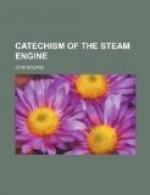144. Q.—Can you state the evaporative efficacy of a pound of coal?
A.—The evaporative efficacy of a pound of carbon has been found experimentally to be equivalent to that necessary to raise 14,000 lbs. of water through 1 degree, or 14 lbs. of water through 1000 degrees, supposing the whole heat generated to be absorbed by the water. Now, if the water be raised into steam from a temperature of 60 deg., then 1118.9 deg. of heat will have to be imparted to it to convert it into steam of 15 lbs. pressure per square inch. 14,000 / 1118.9 = 12.512 Lbs. will be the number of pounds of water, therefore, which a pound of carbon can raise into steam of 15 lbs. pressure from a temperature of 60 deg.. This, however, is a considerably larger result than can be expected in practice.
145. Q.—Then what is the result that may be expected in practice?
A.—The evaporative powers of different coals appear to be nearly proportional to the quantity of carbon in them; and bituminous coal is, therefore, less efficacious than coal consisting chiefly of pure carbon. A pound of the best Welsh or anthracite coal is capable of raising from 9-1/2 to 10 lbs. of water from 212 deg. into steam, whereas a pound of the best Newcastle is not capable of raising more than about 8-1/2 lbs. of water from 212 deg. into steam; and inferior coals will not raise more than 6-1/2 lbs. of water into steam. In America it has been found that 1 lb. of the best coal is equal to 2-1/2 lbs. of pine wood, or, in some cases to 3 lbs.; and a pound of pine wood will not usually evaporate more than about 2 1/2 lbs. of water, though, by careful management, it may be made to evaporate 4 1/2 lbs. Turf will generate rather more steam than wood. Coke is equal or somewhat superior to the best coal in evaporative effect.
146. Q.—How much water will a pound of coal raise into steam in ordinary boilers?




